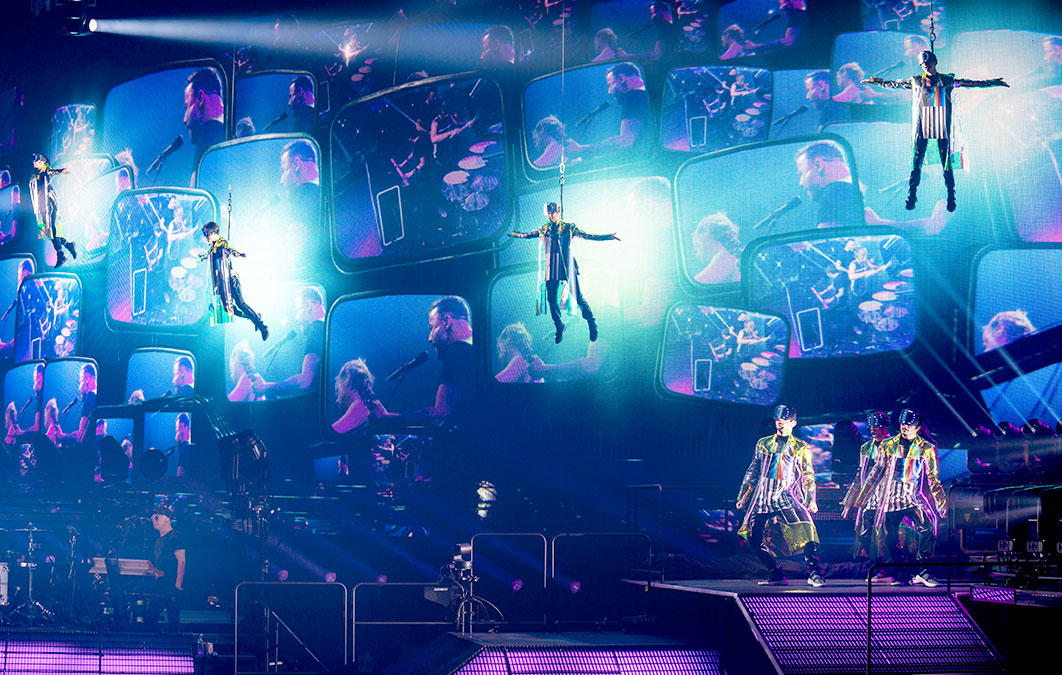
Of course, debating the details of Simulation Theory is a pointless endeavor when it makes no effort to take itself seriously. “Pressure” squanders a surprisingly infectious glam rock stomp with an anti-climactic hook, while “The Dark Side” saves its meandering verses with a soaring chorus -if only the two could meet. Other songs have moments of inspiration as well. “Thought Contagion” is a notable bright spot, if only because it realizes irony is more bearable when you stick a massive chorus in the middle of it. There are brief respites from the drudgery. And “Get Up and Fight” may be the most anodyne protest anthem in Muse’s catalogue -no easy feat -in which two indistinct characters must rise to defeat an unspecified enemy to achieve an unclear goal. The faux-Prince meets slide guitar of “Propaganda” plays with a sex-as-politics conceit that could be funny, if it wasn’t for how obvious it is. There’s no fun to be had with the bland, robotic “Something Human,” because you suspect that’s probably the joke. Simulation Theory would like you to believe it is as camp as Flash Gordon but it falls short of the mark. There is also a flipside that explains why not everything ridiculous can be camp, because any work that desperately wants to be camp is destined to fail. Whether or not they knew what they were doing, Muse believed in their madness, achieving Sontag’s essential element of camp: “a seriousness that fails” because it is too earnest, too overblown. There was a clear earnestness to that album’s use of classical music, theoretical physics, and its ill-fitting Nina Simone cover. In this way, you can argue Origin of Symmetry, Muse’s breakthrough second album, was a camp classic of sorts. In her landmark essay Notes on “Camp,” Susan Sontag notes how camp (an aesthetic Muse have long-used and abused), relies on a sense of naivety and seriousness. What is disturbing is how cynical it feels. Silliness has been Muse’s lifeblood since “Knights of Cydonia” became their signature song and much of their best work is also their most ridiculous (see: “United States of Eurasia” and “Survival”).

The silliness of Simulation Theory isn’t necessarily a problem. But a winking, ironic tone is ever-present in its Stranger Things-aping cover, its overtly-goofy music videos, and its kitschy ‘80s pop sheen. What follows is standard for recent Muse albums -half-baked conspiracy theories, gaudy riffs, and disturbingly-stiff takes on R&B all feature. “Algorithm” opens with Bellamy declaring war against our simulation’s creator, but he may as well be declaring war against good taste. After a dour concept album, 2015’s Drones, Muse ask us to laugh with, not at, them this time all very convenient, when there’s so much to laugh at. Like a teenage boy wearing a Morphsuit, Simulation Theory is ridiculous by design and attempts to preempt its own failure.

#Muse simulation theory full#
This is how the progression of Muse from good-but-ridiculous band to just plain ridiculous comes full circle, with an album that attempts to capture the joy of a bad idea done well. have gone a little OTT on this one, that’s just our simulation glitching. It is also exactly the sort of thing you would expect Muse to write an album about, as it allows them to indulge in camp sci-fi fantasy while keeping an air of intelligence. "It was nice to go back to that really early point in our life in the '80s and find some of the sounds that we liked.Simulation theory, for anyone who hasn’t seen The Matrix, is a theory that argues reality is a complex simulation so realistic it convinces its inhabitant that it’s real. "Most of Muse has been about stuff we sort of came to in our teenage years onwards," he adds. In particular, it was an embrace of modern virtual reality gaming.

In addition to running from stage to studio like the band hadn't done in years, the band members looked to their respective childhoods in the '80s for inspiration, taking elements of pop culture from their earliest memories and appropriating them into the new album.īellamy says Simulation Theory for him began as a reconnection with his childhood love for video games. It was nice keeping the vibe fresh, being on stage and then being in the studio." And that's why the songs came in piecemeal a little bit, because we were breaking it up in between doing shows. "So we thought it might be nice to mix it up and do it that way this time. "In the early years, we made albums where we'd be like touring, then in the studio for a week or two, then back touring again," Bellamy explained.


 0 kommentar(er)
0 kommentar(er)
